
List of Presidents of the People's Republic of China
Encyclopedia
- To avoid confusion, all the names on this list follow the Eastern order convention (family name first, given name second) for consistency.
This is a list of all the Chairmen of the People's Republic of China (1954-1975) and the Presidents of the People's Republic of China
President of the People's Republic of China
The President of the People's Republic of China is a ceremonial office and a part of State organs under the National People's Congress and it is the head of state of the People's Republic of China . The office was created by the 1982 Constitution...
(1982-present). The President of the PRC is called 主席 (zhǔxí), formerly translated as Chairman.
Generations of leadership
Generations of Chinese leadership
Because both the Communist Party of China and the People's Liberation Army promote according to seniority, it is possible to discern distinct generations of Chinese leadership...
:
| № | Portrait | Presidents | Term | Term of office | Vice Presidents | |
|---|---|---|---|---|---|---|
| 1 | Mao Zedong Mao Zedong Mao Zedong, also transliterated as Mao Tse-tung , and commonly referred to as Chairman Mao , was a Chinese Communist revolutionary, guerrilla warfare strategist, Marxist political philosopher, and leader of the Chinese Revolution... 毛泽东(毛澤東) (1893–1976) Beijing Beijing Beijing , also known as Peking , is the capital of the People's Republic of China and one of the most populous cities in the world, with a population of 19,612,368 as of 2010. The city is the country's political, cultural, and educational center, and home to the headquarters for most of China's... At-large |
CP Constitutional history of the People's Republic of China The Constitutional history of the People's Republic of China describes the evolution of its Constitutional system. The first Constitution of the People's Republic of China was promulgated in 1954. After two intervening versions enacted in 1975 and 1978, the current Constitution was promulgated in... |
1 October 1949 (acting) |
27 September 1954 |
Zhu De Zhu De Zhu De was a Chinese militarist, politician, revolutionary, and one of the pioneers of the Chinese Communist Party. After the founding of the People's Republic of China, in 1955 Zhu became one of the Ten Marshals of the People's Liberation Army, of which he is regarded as the founder.-Early... Liu Shaoqi Liu Shaoqi Liu Shaoqi was a Chinese revolutionary, statesman, and theorist. He was Chairman of the People's Republic of China, China's head of state, from 27 April 1959 to 31 October 1968, during which he implemented policies of economic reconstruction in China... Song Qingling Zhang Lan Zhang Lan Zhang Lan , courtesy name Biaofang, was a Chinese political activist best known for being the chairman of the China Democratic League from its founding in 1941 until 1955.-Biography:Zhang was born into a scholarly family in Nanchong, Sichuan in 1872... Li Jishen Li Jishen Li Jishen was a Chinese military commander and statesman. He served as commander of the Fourth Army of the Republic of China, governor of Guangdong, military affairs commissioner, and acting president of the Whampoa Military Academy... Gao Gang Gao Gang Gao Gang was a Chinese Communist Party leader during the Chinese Civil War and the early years of the People's Republic of China , before becoming the victim of the first major purge within the CCP since before 1949... |
|
| 1 1st National People's Congress The 1st National People's Congress was in session from 1954 to 1959. It held four plenary sessions in this period. There were 1226 deputies to the Congress.... |
27 September 1954 |
27 April 1959 |
Zhu De Zhu De Zhu De was a Chinese militarist, politician, revolutionary, and one of the pioneers of the Chinese Communist Party. After the founding of the People's Republic of China, in 1955 Zhu became one of the Ten Marshals of the People's Liberation Army, of which he is regarded as the founder.-Early... |
|||
| 2 | 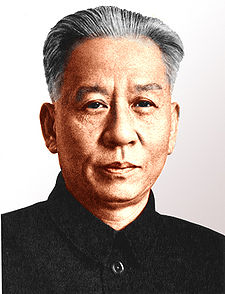 |
Liu Shaoqi Liu Shaoqi Liu Shaoqi was a Chinese revolutionary, statesman, and theorist. He was Chairman of the People's Republic of China, China's head of state, from 27 April 1959 to 31 October 1968, during which he implemented policies of economic reconstruction in China... 刘少奇(劉少奇) (1898–1969) Beijing Beijing Beijing , also known as Peking , is the capital of the People's Republic of China and one of the most populous cities in the world, with a population of 19,612,368 as of 2010. The city is the country's political, cultural, and educational center, and home to the headquarters for most of China's... At-large |
2 2nd National People's Congress The 2nd National People's Congress was in session from 1959 to 1964. It held four plenary sessions in this period.The first plenary session was held in April 1959... |
27 April 1959 |
21 December 1964 |
Song Qingling Dong Biwu Dong Biwu Dong Biwu was a Chinese communist political leader during the regime of Mao Zedong.-Biography:Dong Biwu was born in Huanggang, Hubei. He was the President of China from 1948 to 1949 and Acting President from 1968 until 17 January 1975 when Zhu De became the succeeding Chairman of the Standing... |
| 3 3rd National People's Congress The 3rd National People's Congress was in session from 1964 to 1975. It held only one plenary session in the ten years.The plenary session was held from December 21, 1964 to January 4, 1965... |
21 December 1964 |
31 October 1968 (ousted) |
||||
| — | 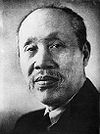 |
Song Qingling Soong Ching-ling Soong Ching-ling , also known as Madame Sun Yat-sen, was one of the three Soong sisters—who, along with their husbands, were amongst China's most significant political figures of the early 20th century. She was the Vice Chairman of the People's Republic of China... 宋庆龄(宋慶齡) (1893–1981) Shanghai Shanghai Shanghai is the largest city by population in China and the largest city proper in the world. It is one of the four province-level municipalities in the People's Republic of China, with a total population of over 23 million as of 2010... At-large ---- Dong Biwu Dong Biwu Dong Biwu was a Chinese communist political leader during the regime of Mao Zedong.-Biography:Dong Biwu was born in Huanggang, Hubei. He was the President of China from 1948 to 1949 and Acting President from 1968 until 17 January 1975 when Zhu De became the succeeding Chairman of the Standing... 董必武 (1886-1975) Hubei Hubei ' Hupeh) is a province in Central China. The name of the province means "north of the lake", referring to its position north of Lake Dongting... At-large |
3 2nd National People's Congress The 2nd National People's Congress was in session from 1959 to 1964. It held four plenary sessions in this period.The first plenary session was held in April 1959... (cont) |
31 October 1968 (acting) |
24 February 1972 (resigned) ---- 17 January 1975 |
vacant |
| * | as NPCSC Chairman ---- Zhu De Zhu De Zhu De was a Chinese militarist, politician, revolutionary, and one of the pioneers of the Chinese Communist Party. After the founding of the People's Republic of China, in 1955 Zhu became one of the Ten Marshals of the People's Liberation Army, of which he is regarded as the founder.-Early... 朱德 (1886–1976) Sichuan Sichuan ' , known formerly in the West by its postal map spellings of Szechwan or Szechuan is a province in Southwest China with its capital in Chengdu... At-large |
4 4th National People's Congress The 4th National People's Congress was in session from 1975 to 1978. It held only one plenary sessions in January 1975. There were 2864 deputies to this Congress.The Congress passed the 1975 Constitution of the People's Republic of China.... |
17 January 1975 |
6 July 1976 (died in office) |
vacant | |
| * | as NPCSC Chairwoman ---- Song Qingling Soong Ching-ling Soong Ching-ling , also known as Madame Sun Yat-sen, was one of the three Soong sisters—who, along with their husbands, were amongst China's most significant political figures of the early 20th century. She was the Vice Chairman of the People's Republic of China... 宋庆龄(宋慶齡) (1893–1981) Shanghai Shanghai Shanghai is the largest city by population in China and the largest city proper in the world. It is one of the four province-level municipalities in the People's Republic of China, with a total population of over 23 million as of 2010... At-large |
4 4th National People's Congress The 4th National People's Congress was in session from 1975 to 1978. It held only one plenary sessions in January 1975. There were 2864 deputies to this Congress.The Congress passed the 1975 Constitution of the People's Republic of China.... (cont) |
6 July 1976 |
5 March 1978 |
vacant | |
| * | as NPCSC Chairman ---- Ye Jianying Ye Jianying Ye Jianying was a Chinese communist general and the chairman of the Standing Committee of the National People's Congress from 1978 to 1983.-Biography:... 叶剑英(葉劍英) (1897–1986) Guangdong Guangdong Guangdong is a province on the South China Sea coast of the People's Republic of China. The province was previously often written with the alternative English name Kwangtung Province... At-large (54-59) PLA People's Liberation Army The People's Liberation Army is the unified military organization of all land, sea, strategic missile and air forces of the People's Republic of China. The PLA was established on August 1, 1927 — celebrated annually as "PLA Day" — as the military arm of the Communist Party of China... At-large (59-83) |
5 5th National People's Congress The 5th National People's Congress was in session from 1978 to 1983. It held five plenary sessions in this period.The Congress passed the 1978 Constitution of the People's Republic of China and the current Constitution of the People's Republic of China in 1982.-Elected state leaders:*Chairman of... |
5 March 1978 |
16 May 1981 |
vacant | |
| — | as Honorary President ---- Song Qingling Soong Ching-ling Soong Ching-ling , also known as Madame Sun Yat-sen, was one of the three Soong sisters—who, along with their husbands, were amongst China's most significant political figures of the early 20th century. She was the Vice Chairman of the People's Republic of China... 宋庆龄(宋慶齡) (1893–1981) Shanghai Shanghai Shanghai is the largest city by population in China and the largest city proper in the world. It is one of the four province-level municipalities in the People's Republic of China, with a total population of over 23 million as of 2010... At-large |
5 5th National People's Congress The 5th National People's Congress was in session from 1978 to 1983. It held five plenary sessions in this period.The Congress passed the 1978 Constitution of the People's Republic of China and the current Constitution of the People's Republic of China in 1982.-Elected state leaders:*Chairman of... (cont) |
16 May 1981 |
28 May 1981 |
vacant | |
| * | as NPCSC Chairman ---- Ye Jianying Ye Jianying Ye Jianying was a Chinese communist general and the chairman of the Standing Committee of the National People's Congress from 1978 to 1983.-Biography:... 叶剑英(葉劍英) (1897–1986) Guangdong Guangdong Guangdong is a province on the South China Sea coast of the People's Republic of China. The province was previously often written with the alternative English name Kwangtung Province... At-large (54-59) PLA People's Liberation Army The People's Liberation Army is the unified military organization of all land, sea, strategic missile and air forces of the People's Republic of China. The PLA was established on August 1, 1927 — celebrated annually as "PLA Day" — as the military arm of the Communist Party of China... At-large (59-83) |
5 5th National People's Congress The 5th National People's Congress was in session from 1978 to 1983. It held five plenary sessions in this period.The Congress passed the 1978 Constitution of the People's Republic of China and the current Constitution of the People's Republic of China in 1982.-Elected state leaders:*Chairman of... (cont) |
28 May 1981 |
18 June 1983 |
vacant | |
| 3 | 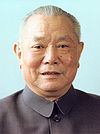 |
Li Xiannian Li Xianniàn Li Xiannian was President of the People's Republic of China between 1983 and 1988 and then chairman of the Chinese People's Political Consultative Conference until his death. He was an influential political figure throughout the PRC, having been a member of the Politburo of the Communist Party of... 李先念 (1909–1992) Hubei Hubei ' Hupeh) is a province in Central China. The name of the province means "north of the lake", referring to its position north of Lake Dongting... At-large |
6 6th National People's Congress The 6th National People's Congress was in session from 1983 to 1988. It held five plenary sessions in this period.-Elected state leaders:In the 1st Plenary Session in 1983, the Congress elected the state leaders:... |
18 June 1983 |
8 April 1988 |
Ulanhu Ulanhu Ulanhu was the founder of the Inner Mongolia Autonomous Region in China, Ulanhu had the nickname of "Mongolian Khan" during his political career.-Career:... |
| 4 | 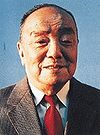 |
Yang Shangkun Yang Shangkun Yang Shangkun was President of the People's Republic of China from 1988 to 1993, and was permanent Vice-chair of the Central Military Commission... 杨尚昆(楊尚昆) (1907-1998) Sichuan Sichuan ' , known formerly in the West by its postal map spellings of Szechwan or Szechuan is a province in Southwest China with its capital in Chengdu... At-large  |
7 7th National People's Congress The 7th National People's Congress was in session from 1988 to 1993. It held five plenary sessions in this period.-Elected state leaders:In the 1st Plenary Session in 1988, the Congress elected the state leaders:... |
8 April 1988 |
27 March 1993 |
Wang Zhen Wang Zhen Wang Zhen was a Chinese political figure and one of the Eight Immortals of the Communist Party of China.-Early years:Like most Chinese communist leaders, Wang was a commander in his early years... |
| 5 | 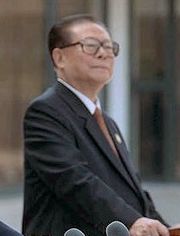 |
Jiang Zemin Jiang Zemin Jiang Zemin is a former Chinese politician, who served as General Secretary of the Communist Party of China from 1989 to 2002, as President of the People's Republic of China from 1993 to 2003, and as Chairman of the Central Military Commission from 1989 to 2005... 江泽民(江澤民) (1926-) Shanghai Shanghai Shanghai is the largest city by population in China and the largest city proper in the world. It is one of the four province-level municipalities in the People's Republic of China, with a total population of over 23 million as of 2010... At-large |
8 8th National People's Congress The 8th National People's Congress was in session from 1993 to 1998. It held five plenary sessions in this period.-Elected state leaders:In the 1st Plenary Session in 1993, the Congress elected the state leaders:... |
27 March 1993 |
15 March 1998 |
Rong Yiren Rong Yiren Rong Yiren was the Vice-President of the People's Republic of China from 1993 to 1998 and was heavily involved with the opening of the Chinese economy to western investment. It is from this second accomplishment, that the western media called him "The Red Capitalist".-Biography:Rong was born in... |
| 9 9th National People's Congress The 9th National People's Congress was in session from 1998 to 2003. It held five plenary sessions in this period. There were 2,979 deputies to this Congress.-Elected state leaders:*President of the People's Republic of China: Jiang Zemin... |
15 March 1998 |
23 March 2003 |
Hu Jintao Hu Jintao Hu Jintao is the current Paramount Leader of the People's Republic of China. He has held the titles of General Secretary of the Communist Party of China since 2002, President of the People's Republic of China since 2003, and Chairman of the Central Military Commission since 2004, succeeding Jiang... |
|||
| 6 | Hu Jintao Hu Jintao Hu Jintao is the current Paramount Leader of the People's Republic of China. He has held the titles of General Secretary of the Communist Party of China since 2002, President of the People's Republic of China since 2003, and Chairman of the Central Military Commission since 2004, succeeding Jiang... 胡锦涛(胡錦濤) (1942-) Guizhou Guizhou ' is a province of the People's Republic of China located in the southwestern part of the country. Its provincial capital city is Guiyang.- History :... At-large (88-93,98-03) Tibet Tibet Autonomous Region The Tibet Autonomous Region , Tibet or Xizang for short, also called the Xizang Autonomous Region is a province-level autonomous region of the People's Republic of China , created in 1965.... At-large (93-98,03-08) Zhejiang Zhejiang Zhejiang is an eastern coastal province of the People's Republic of China. The word Zhejiang was the old name of the Qiantang River, which passes through Hangzhou, the provincial capital... At-large (08-) |
10 10th National People's Congress The 10th National People's Congress was in session from 2003 to 2008. It held five plenary sessions in this period. There are 2,985 deputies to this Congress.-The 1st Plenary Session:The First Plenary Session was held in 2003... |
23 March 2003 |
15 March 2008 |
Zeng Qinghong Zeng Qinghong Zeng Qinghong was the Vice-President of the People's Republic of China from 2003 to 2008. He became a member of the Politburo Standing Committee and member of the Secretariat of the CPC Central Committee during the 2002 16th Party Congress. Although he was formally ranked fifth in the nine PSC... |
|
| 11 11th National People's Congress The 11th National People's Congress is in session from 2008 to 2013. It is scheduled to hold five plenary sessions in this period, occurring around early March every year. There are 2,985 deputies to this Congress.-The 1st Plenary Session:... |
15 March 2008 |
Incumbent (term expires 2013) |
Xi Jinping Xi Jinping Xi Jinping is a high ranking politician of the People's Republic of China. He currently serves as the top-ranking member of the Secretariat of the Communist Party of China, the country's Vice President, Vice-Chairman of the Central Military Commission, President of the Central Party School and the... |
|||
See also
- List of Vice Presidents of the People's Republic of China
- List of premiers of the People's Republic of China
- Paramount LeaderParamount leaderParamount leader literally "the highest leader of the party and the state ", in modern Chinese political science, unofficially refers to the political leader of the People's Republic of China....
- a list of the those who have been "the highest leader of the party and the country" in the PRC

